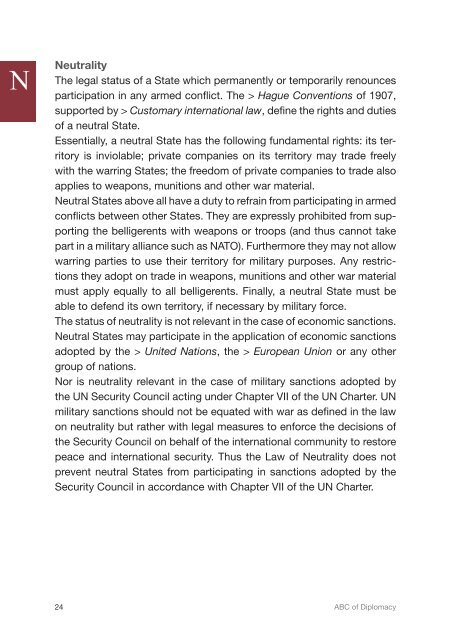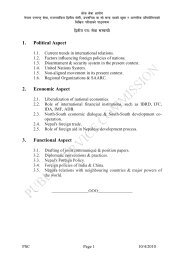ABC-Diplomatie_en
You also want an ePaper? Increase the reach of your titles
YUMPU automatically turns print PDFs into web optimized ePapers that Google loves.
N<br />
Neutrality<br />
The legal status of a State which perman<strong>en</strong>tly or temporarily r<strong>en</strong>ounces<br />
participation in any armed conflict. The > Hague Conv<strong>en</strong>tions of 1907,<br />
supported by > Customary international law, define the rights and duties<br />
of a neutral State.<br />
Ess<strong>en</strong>tially, a neutral State has the following fundam<strong>en</strong>tal rights: its territory<br />
is inviolable; private companies on its territory may trade freely<br />
with the warring States; the freedom of private companies to trade also<br />
applies to weapons, munitions and other war material.<br />
Neutral States above all have a duty to refrain from participating in armed<br />
conflicts betwe<strong>en</strong> other States. They are expressly prohibited from supporting<br />
the belliger<strong>en</strong>ts with weapons or troops (and thus cannot take<br />
part in a military alliance such as NATO). Furthermore they may not allow<br />
warring parties to use their territory for military purposes. Any restrictions<br />
they adopt on trade in weapons, munitions and other war material<br />
must apply equally to all belliger<strong>en</strong>ts. Finally, a neutral State must be<br />
able to def<strong>en</strong>d its own territory, if necessary by military force.<br />
The status of neutrality is not relevant in the case of economic sanctions.<br />
Neutral States may participate in the application of economic sanctions<br />
adopted by the > United Nations, the > European Union or any other<br />
group of nations.<br />
Nor is neutrality relevant in the case of military sanctions adopted by<br />
the UN Security Council acting under Chapter VII of the UN Charter. UN<br />
military sanctions should not be equated with war as defined in the law<br />
on neutrality but rather with legal measures to <strong>en</strong>force the decisions of<br />
the Security Council on behalf of the international community to restore<br />
peace and international security. Thus the Law of Neutrality does not<br />
prev<strong>en</strong>t neutral States from participating in sanctions adopted by the<br />
Security Council in accordance with Chapter VII of the UN Charter.<br />
24 <strong>ABC</strong> of Diplomacy






